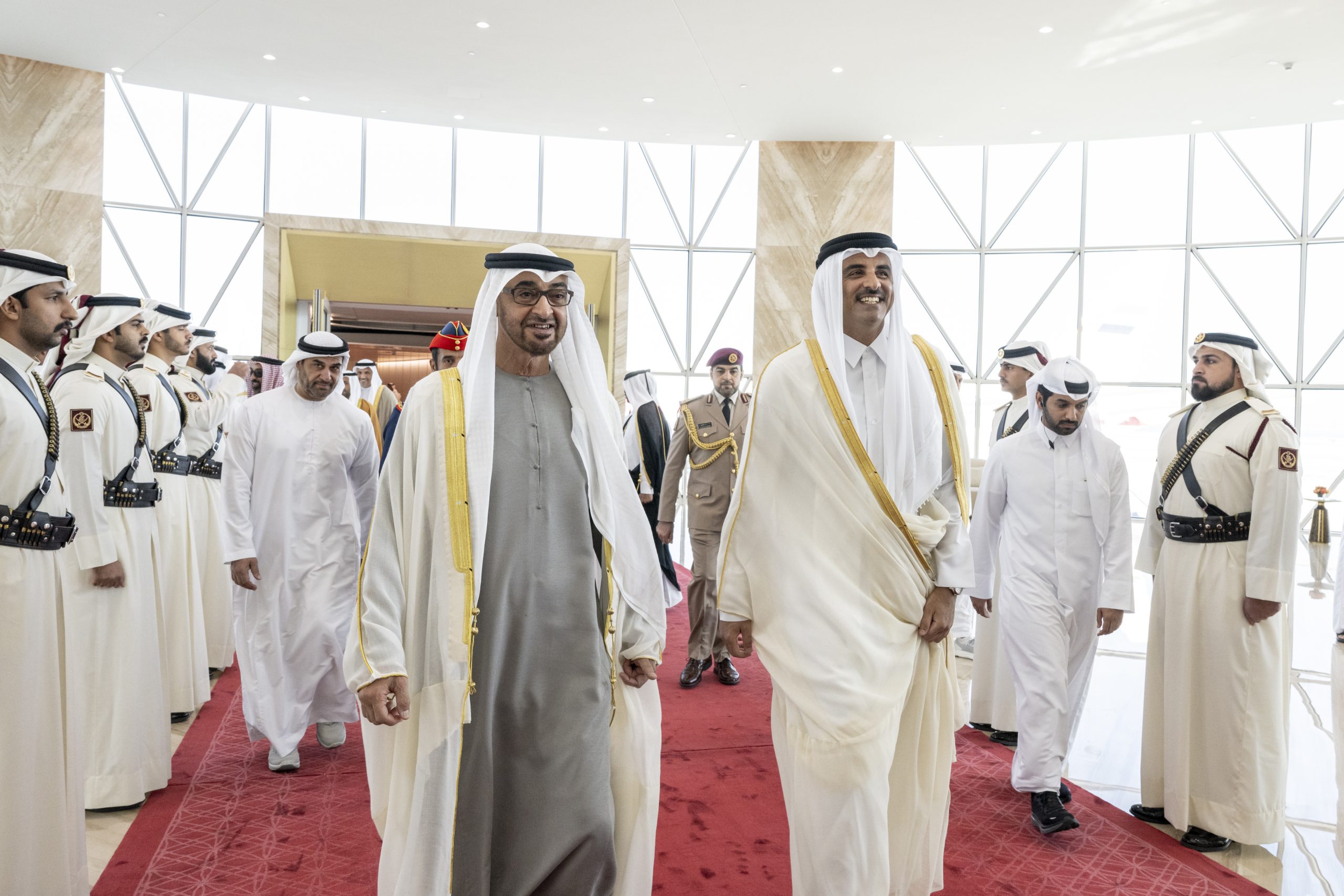Qatar’s Amir and UAE’s president discuss regional tensions over Iran’s retaliatory strike on Israel, urging de-escalation and renewing calls for a ceasefire in Gaza.
Qatar’s Amir Sheikh Tamim bin Hamad Al-Thani and President of the United Arab Emirates Sheikh Mohamed bin Zayed Al Nahyan discussed regional escalations over the phone on Sunday following Iran’s retaliatory attack on Israel.
During the phone call, both leaders “stressed the need to reduce all forms of escalation and avoid expanding the conflict in the region,” according to Amiri Diwan.
The Qatari amir and Emirati president also called for the need to reach a ceasefire in Gaza and a “final solution to the Palestinian cause that achieves a lasting and comprehensive peace in the region.”
Qatar, the host of a Hamas political office, alongside Egypt, have been at the forefront of de-escalation efforts in Gaza. Neighbouring UAE has maintained ties with Israel since the signing of the Abraham Accords in 2020.
The phone call also came after Iran launched an attack on Israel on Saturday night in retaliation for the bombing of its consulate in Damascus on April 1. The Israeli attack killed seven members of Iran’s Revolutionary Guards (IRGC), including two generals.
Saturday’s retaliatory attack marked the first direct Iranian military attack on its rival, Israel.
In a phone call on Sunday, Qatar’s Prime Minister and Minister of Foreign Affairs Sheikh Mohammed bin Abdulrahman Al-Thani and Iran’s Foreign Minister Hossein Amir-Abdollahian discussed regional escalations.
Sheikh Mohammed voiced Qatar’s “deep concern regarding the recent developments in the region, urging all parties to calm and exercise the utmost restraint.”
Moments before the Iranian attack, several countries temporarily closed off their airspace until the next morning, including Jordan, Lebanon, and Iraq, raising a state of panic, especially among travellers at the airports.
Iran had launched 170 drones, more than 30 cruise missiles, and more than 120 ballistic missiles, Israel’s military spokesman Daniel Hagari confirmed on Sunday, claiming Israel “intercepted 99 percent of the launches”.
The United States, the United Kingdom, France and Jordan downed some drones and missiles.
However, Iran’s state media reported that the country’s drone and missile attacks dealt “heavy blows” to an air base in the Negeb (Negev) desert.
A senior U.S. official told ABC News that at least nine Iranian missiles struck two of Israel’s air bases without causing significant damage.
Qatar, Russia, China, Turkiye, the UAE, Egypt, and Jordan had called for restraint. The U.S., European Union, UK, United Nations, and the Group of Seven leaders condemned the attack.
In a statement on Sunday, the G7 expressed its “full solidarity and support to Israel and its people.”
“With its actions, Iran has further stepped toward the destabilization of the region and risks provoking an uncontrollable regional escalation. This must be avoided,” the G7 added.
Israel vowed to respond to the attack while expressing its appreciation for the U.S., the UK and France’s help.
“Whoever harms us, we will harm them. We will defend ourselves against any threat and will do so level-headedly and with determination,” Israeli Prime Minister Benjamin Netanyahu said.
A senior administration official separately told CNN on Sunday that Biden “made clear the U.S. will not participate in any offensive operations against Iran.”
Meanwhile, Tehran said that it had notified Turkiye and regional countries about the planned attack 72 hours in advance, something that the U.S. denied.
The region has been witnessing a rise in tensions since Israel launched its genocidal war on Gaza on October 7, 2023. Israel has since killed at least 33,729 people in Gaza and displaced more than 80 percent of the population.
Such escalations have been occurring in the Red Sea and Yemen with the Houthi rebels in addition to cross-border attacks between Hezbollah and Israel in southern Lebanon.
The groups in Lebanon, Syria, Yemen, Gaza and Iraq fall under what is widely known as the “axis of resistance” – an informal anti-Israel coalition.
Fears over a wide-scale regional war have been echoed by the international community over the past six months, with the ceasefire talks having yet to yield any breakthrough.







